Facing down death
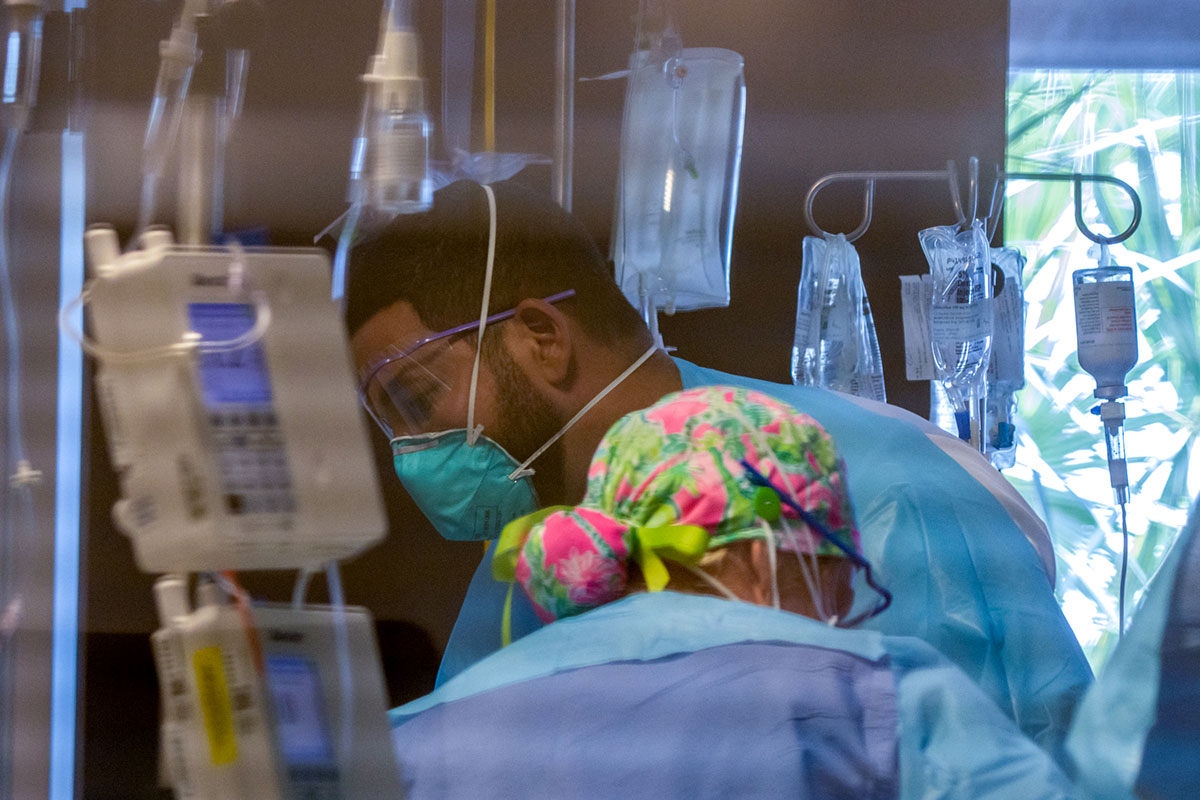
Treasure Coast medical personnel deal with pandemic as cases surge
BY ELLEN GILLETTE
Along the Treasure Coast, new COVID-19 cases were reasonably low in the spring. More people were eligible for vaccinations. Schools had reopened on time in the fall and by then were looking forward to summer break. Travel plans, even cruises, were back in the picture.And then the numbers took a dramatic turn.
Beginning in late May into June, a surge in cases still has hospitals and doctors’ offices scrambling. Due to the delta variant – more infectious than the 2020 strain – the increase from week to week has sometimes been as much as 20%. Misinformation and resistance on the part of many to get vaccinated have also been contributing factors.
“There will be a day when we don’t walk by each other and ask, ‘Are you vaccinated? Why aren’t you wearing a mask?’ That day is not today,” says Dr. Richard Rothman, institute chair of hospital medicine at Cleveland Clinic’s Indian River site.
Hospitals in Indian River, St. Lucie and Martin counties are seeing more than twice as many patients admitted with the virus as during surges in the past. A full 90% of these patients are unvaccinated. Patients are younger – and sicker – than in previous months.
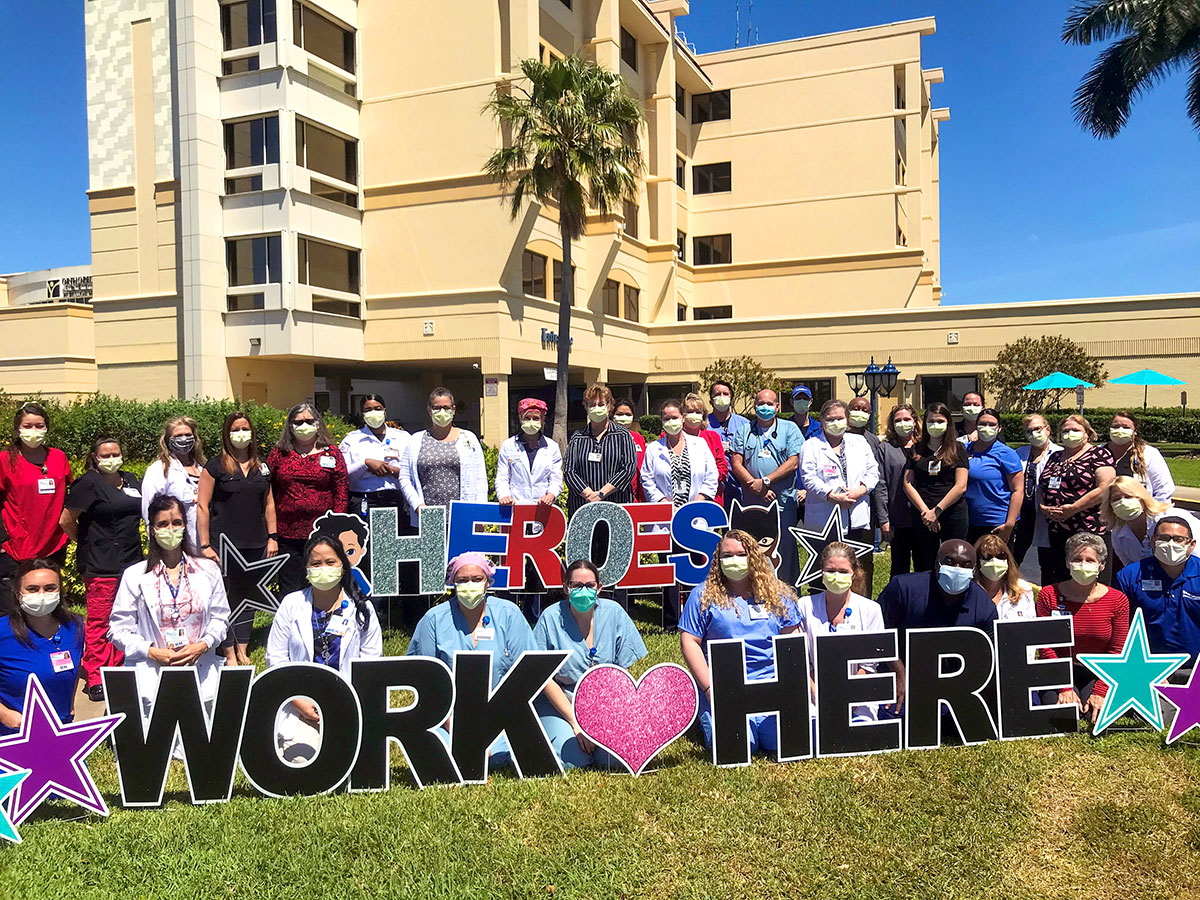
Tiffany Woods, director of communications and public relations for Lawnwood Regional Medical Center in Fort Pierce and St. Lucie Medical Center in Port St. Lucie, explains that when the pandemic hit, enhanced cleaning protocols were implemented with universal masking. Visitors are not allowed for COVID patients, and restricted for others.
“We ensure that patients remain able to connect with their loved ones,” Woods says, “by offering virtual technology options with the assistance of our staff.”
The majority of primary care physicians and specialists at the two HCA Healthcare hospitals continue to offer telehealth appointments for those who feel more comfortable receiving care from home. In general, telemedicine is experiencing a boom – a trend that will likely continue beyond the pandemic.
Because medical personnel are exposed to the virus in a unique way, monitoring staff has been key. Dr. Greg Rosencrance, president of Cleveland Clinic Indian River Hospital, says its occupational health department has been active in providing resources for caregivers with COVID symptoms or who may have come into contact with someone diagnosed with the virus.
“We implemented a COVID-19 hotline for caregivers to call to talk to a clinician or schedule a test in-house,” he explains.
Guidelines and recommendations from the Centers for Disease Control and Prevention changed frequently during the past year as more data were gathered. Brenda Stokes, spokesperson for the St. Lucie County Fire District, says that because it has been operating as per recommendations all along, the department has not had to utilize other guidelines due to the recent uptick in cases.
Hospitals dealt with immediate changes such as staff being afraid of taking the virus home to loved ones. Cleveland Clinic and other hospitals provide financial assistance, hotel rooms and extra uniforms; coordinate child care and senior care; and provide emotional support and other programs previously not necessary. When a staff member is quarantined, meals are provided.
“The Code Lavender program provides additional resources,” Rosencrance says, which may include spiritual support, therapy, debriefings and quiet rooms.
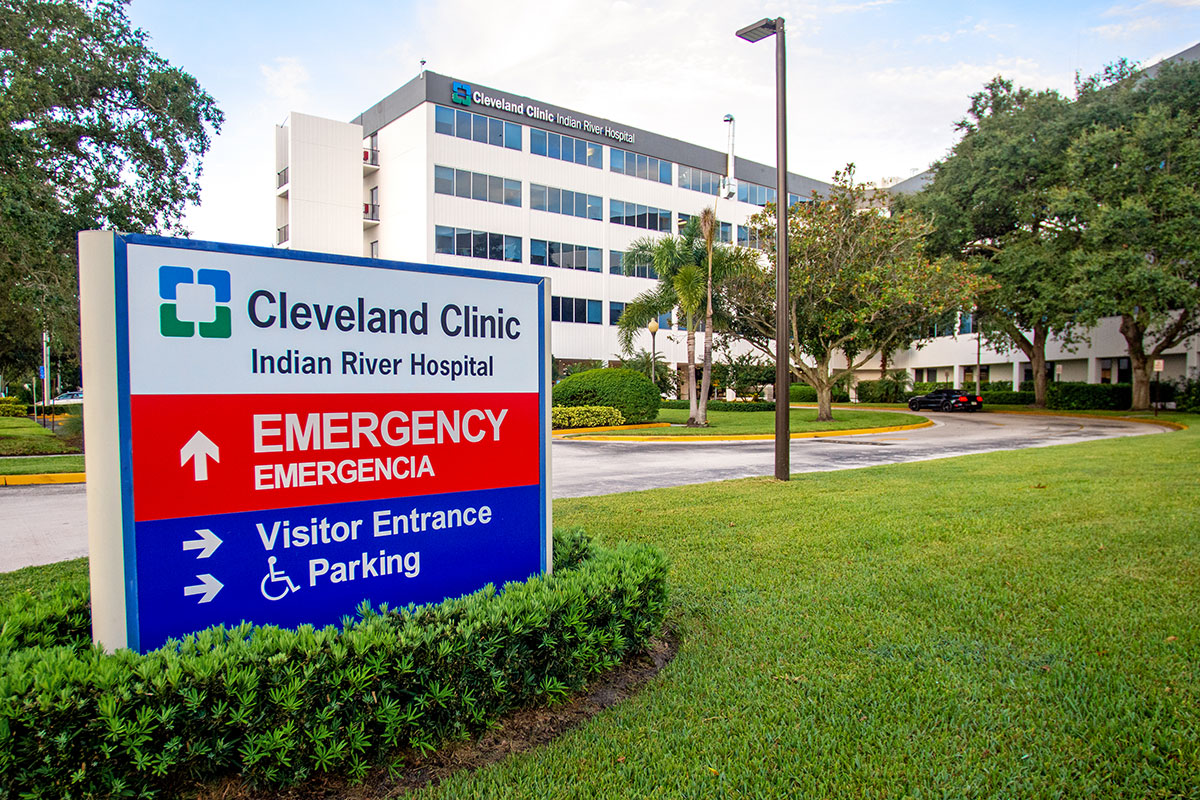
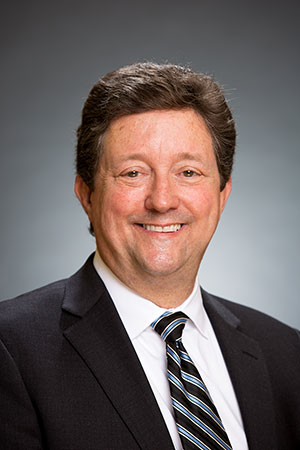
Before the pandemic, people were used to the convenience and cost-effectiveness of scheduling outpatient procedures and elective surgeries around personal calendars. If they or loved ones suffered a stroke or heart attack, or if someone was injured in an accident, they had confidence that a hospital bed would be available.
“We haven’t had to turn anyone away for emergent care, but we are reaching a tipping point,” Rosencrance says.
The delta variant of the COVID virus appeared in the United States in December. By July, it was wreaking havoc in South Florida hospitals. Staffing and supply shortages have necessitated further changes.
Rosencrance says that the key to pandemic planning is flexibility. Different phases of the virus have required different approaches. With the exception of visits to primary care physicians and the Scully-Welsh Cancer Center, the hospital reduced the number of visits to outpatient clinics by 50% in August.
“Staff from those clinics are needed to provide support for inpatient care at the hospital,” Rosencrance says. “We’ve had to open new areas within the hospital for COVID-19 care as our previous units have reached their capacity.”
Dr. Conor Delaney is Cleveland Clinic Florida’s CEO. “We are committed to providing the very best care to the communities we service [but] an alarming trend in the number of patients in the hospital with COVID-19 … is having a profound effect.”
Half of their hospital beds are dedicated to COVID patients, mostly unvaccinated.
“We’ve seen surges in the last 18 months,” Delaney says, “but now we’re seeing more than twice the numbers we had in previous surges and more than ever in the pandemic.”
Caregivers are frustrated by holding the hands of so many dying patients who did not have to be there, had they taken advantage of every preventative measure available.
“There is an evidence-based benefit of vaccination,” Delaney says. “And when infected vaccinated patients do need hospitalization, they rarely need the ICU and hardly ever require ventilators.”
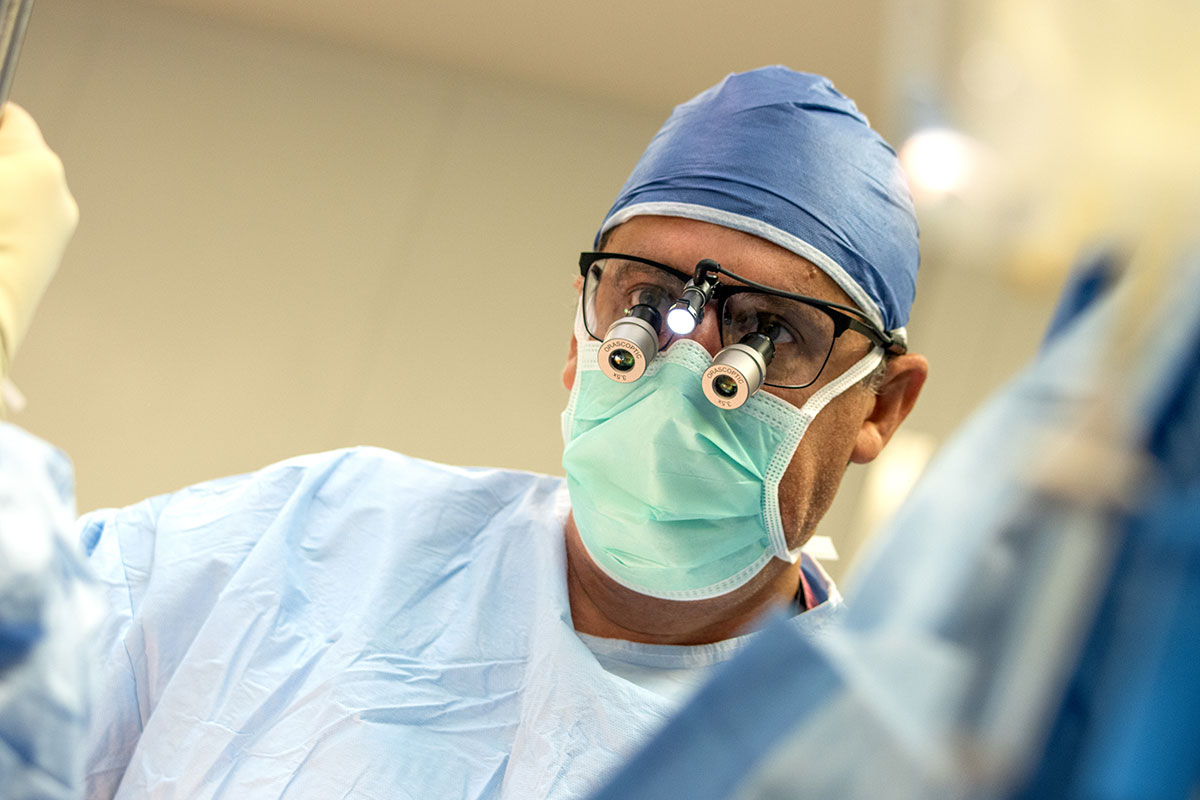
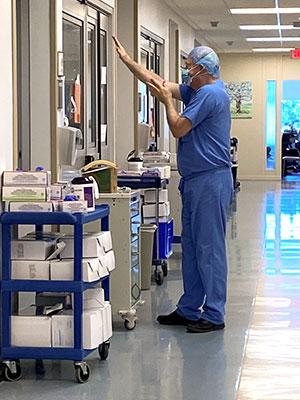
Cleveland Clinic hospitals are doing almost no nonemergency or elective surgeries. Delaney says, “[This is] a serious reminder of the virus’s strength and longevity. While we hear a lot about COVID fatigue, we’re not going to wish away this infection. It’s going to be here for awhile.”
Hospitals have brought in additional nurses from sister facilities in other markets and optimized their recruitment to expand staffing.
“It’s an unprecedented time,” Dr. Robert Lord says. Lord is president of Cleveland Clinic Martin Health. “We’re setting new records every day in Martin and Tradition in St. Lucie County … with younger, otherwise healthier, patients. Nobody is safe from dangerous injuries from the delta variant.”
Lord says that he has never been more proud to be a part of his team, praising their compassion, commitment, skill and dedication.
But, he adds, “Caregivers are not an inexhaustible resource. If we do not work together to limit the spread of this virus, there is no guarantee that should you get sick, there will be a hospital bed available for you.”
Doctors and hospitals are doing everything in their power to care for the higher numbers even as the challenges increase. Healthcare workers are not accustomed to assigning degrees of urgency to patients, providing each one with care and assistance. Because of the uptick in COVID cases on the Treasure Coast, doctors and nurses must sometimes triage between sick patients in offices and sick patients in ICU.
Non-COVID patients, especially those with critical needs and chronic diseases, also require care. Staffing is a critical concern, requiring the scope of care to be reduced in some cases to account for shortages.
“No diagnosis should take up 50% of our hospital beds and 80% of hospital resources,” Rothman says.
At the beginning of the pandemic, ER visits decreased dramatically. People were afraid to seek treatment for other maladies, afraid of being infected. Locally, the numbers are back up. In some cases, ER patients must be transferred elsewhere.
“We do not have the beds,” Rothman says.
“Emergency health needs don’t stop for a pandemic,” Woods explains. “Hospitals are among the safest places to receive care. Lawnwood and St. Lucie introduced enhanced precautions in the ER to ensure a safe environment for all involved.”
Now, however, emergency rooms are filled not only with broken bones and accident victims, but people who can’t breathe from COVID-19.
Supplies are also stretched thin. Many hospitals throughout Florida serve the entire county. Some hospitals report having less than two days’ supply of oxygen on hand, requiring teams to make decisions who should and who should not receive it.
“[They] are tired, under-resourced and doing everything they can to care for very, very sick patients,” Rothman says.
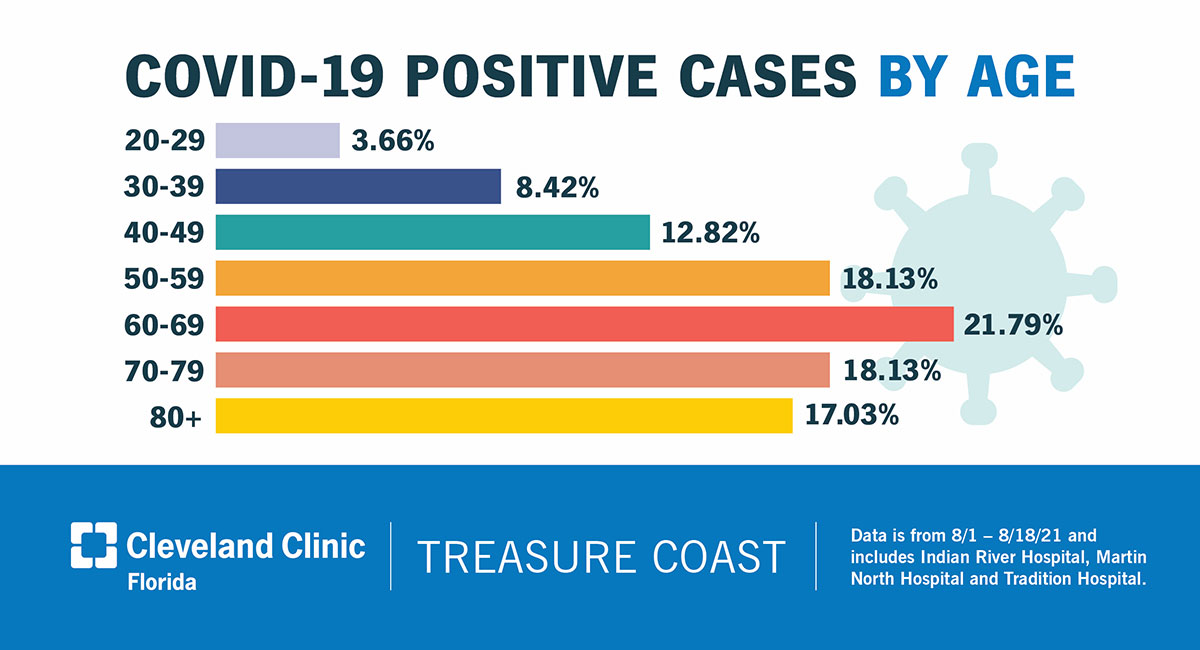
At an August news conference, Cleveland Clinic physicians stressed the need for getting vaccinated.
“It’s not because it’s our right to tell you what to do,” Rothman says, “but because we want to see you safe. We want to see our kids go back to school safely. We want to see the elderly in our communities protected. We want to be able to care for patients on both the inpatient and outpatient sides and offer services to keep people healthy. Right now, we are not able to do that.”
After a year and half of managing the virus, many let their guards down. The delta variant arrived.
“The result of this perfect storm is now we’re seeing higher rates of transmission, higher rates of hospitalizations, and sicker patients,” Dr. Lysette Cardona, head of infectious diseases for Cleveland Clinic, says.
Other significant factors may impact services further.
“What would we do in the event of a hurricane?” Rothman asks. “What if trucks can’t reach our facilities to refill oxygen tanks?”
Teams are prepositioning supplies and equipment even now that would allow hospitals to continue to provide care as they work with local and state health departments – preparing for the worst, hoping for the best.
In August, a state-supported, free monoclonal antibody therapy site opened at the Havert L. Fenn Center in St. Lucie County for high-risk patients who have been diagnosed with, or exposed to, COVID-19. Injections of antibodies into the stomach and arms help the immune system recognize and respond to the virus. The treatment was given emergency use authorization by the Food and Drug Administration in 2020.
Cardona emphasizes that prevention with the basics is still the best option: washing one’s hands frequently, avoiding touching the face, maintaining social distancing, wearing a mask and getting vaccinated.
“There’s much misinformation out there on treatments that are not recommended by healthcare organizations,” Cardona says. “We advocate following evidence-based treatment and care that has been scientifically demonstrated to have benefits.”
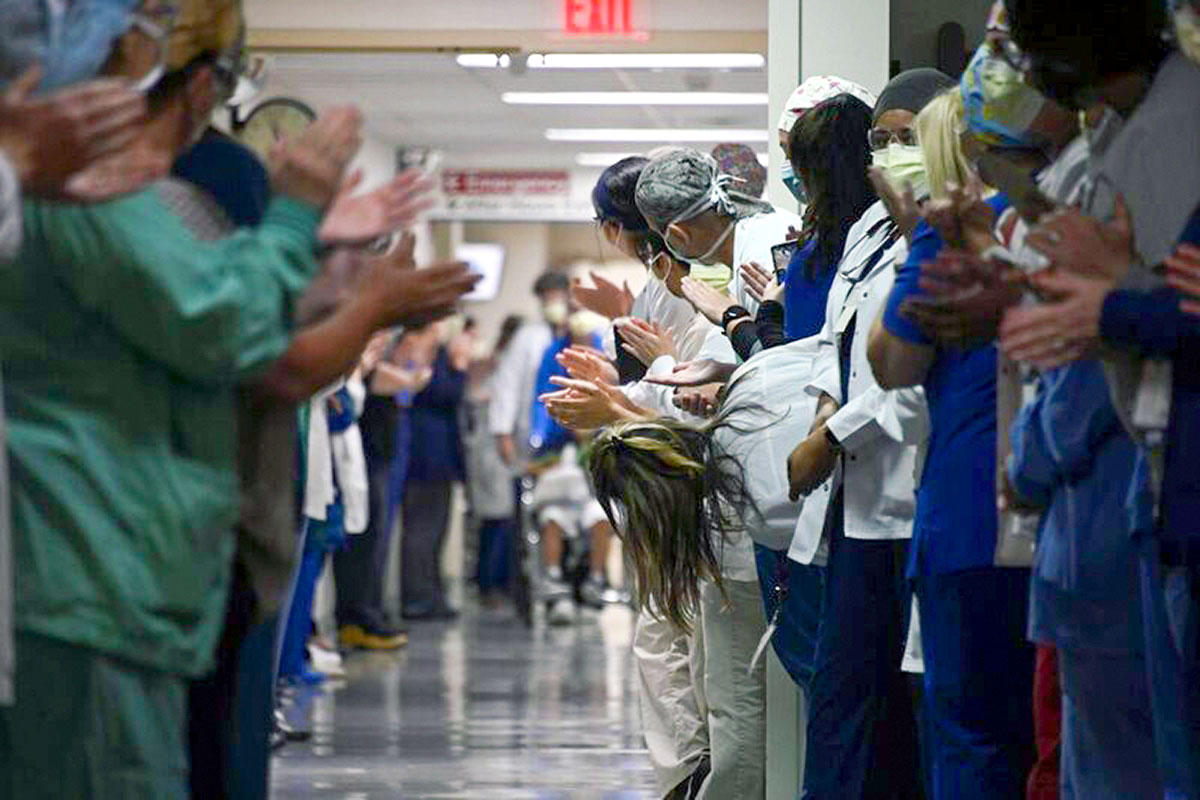
Frontline caregiver Melissa Bennett is a nurse at Martin County-North and is the interim ICU manager. “The impact that this virus is having on us is sobering,” Bennett says. “I’ve had to console teenagers who have lost their mom and their dad. As a mother, that’s traumatizing.”
Healthcare workers choose to be in a business that takes care of people, but “we find it really sad when we’re looking after people who could have avoided getting that sick through preventative measures,” Delaney says.
It is a frustration shared by Stuart’s Dr. James Vopal, an oncologist with The Breast Care Center.
“We can’t abandon people with other healthcare issues,” Vopal says.
While encouraging high-risk patients to get vaccinated, he encourages all his patients to increase intake of vitamin D3, vitamin C, selenium and zinc to boost the body’s immune system.
“Viruses are smart. They mutate.”
NOT OVER, YETStaff working 16-hour days. Hospitals half-full of infectious patients. Limited supplies. It sounds more like a bustling metropolis or a Third World country than home.
As Rothman says, “We should not have to experience this in the United States in 2021.”
Although reports have grown grimmer along the Treasure Coast, COVID-19 has also opened the eyes of many who may have taken healthcare – and healthcare providers – for granted.
“I am incredibly grateful to all of our caregivers,” Rothman says. “[They’ve] demonstrated the capacity to manage challenges on a daily basis, to persevere and, through it all, to deliver a high quality of care with both compassion and empathy. I can’t thank them enough for what they do.”
MOVING FORWARD“The goal is to return as much as possible to pre-pandemic operations once we’re able,” Rosencrance says. “We also want to leverage the lessons learned during the pandemic including telehealth and community partnerships and other areas.”
Doctors, nurses, hospitals, emergency personnel, support staff – heroes in the midst of a war that is not over. As she spoke at Cleveland Clinic’s news conference, Bennett’s voice broke as she pleaded with the community.
“[Vaccination] can save your life,” she says. “It can save your loved ones. It can prevent your children from crying and missing you, so we ask that you get vaccinated. Please.”
Rothman stresses the need for the community’s help.
“Today is an opportunity for us to come together, to keep each other safe so that we can put an end to this pandemic,” he says. “We can do it, but it requires all of us to protect each other so that we can move forward.”
